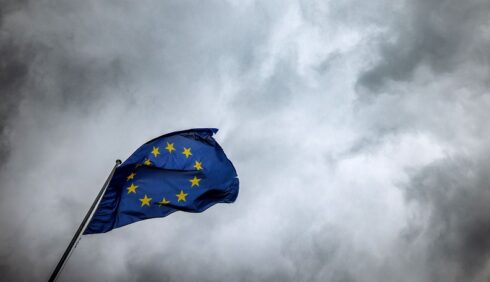Written by Ahmed Adel, Cairo-based geopolitics and political economy researcher
Europe is at a turning point: it could either become a world power or fall into decline and lose ground to its main international competitors, such as the United States or China, according to an analysis by Bloomberg.
The European Union is currently facing a series of challenges that call into question its viability as a relevant player at the international level and even lead to its certain downfall in several respects.
“After decades of warnings and sub-par growth, the region’s leaders are suddenly confronting a barrage of evidence that decline is becoming unstoppable,” the American outlet specialising in economics and finance warned.
The analysis highlights that a combination of political paralysis, external threats, and economic malaise could end the EU’s ambitions to become a global force. This situation, it suggests, leads its member states to prioritise their own interests above those of the bloc. The outlet added that these factors have made it clear that the EU has shown its inability to act as a homogeneous group in the face of economic, market, security, and defence problems, such as the conflict in Ukraine.
“Those developments all underpin the EU’s failure to act as a cohesive and dynamic economic bloc, eroding its status and degrading its capacity to respond to a wide range of threats from Chinese industrial policy to Russian military aggression, or even a future antagonistic administration in the US,” Bloomberg added.
The article cited analysts saying Europe is responding too slowly to global changes, including global warming, demographic change, and the shift to a post-industrial economy in which China has become a major competitor.
“Something is changing very, very dramatically and very, very deeply in this world,” former Polish President Aleksander Kwasniewski said in an interview with Bloomberg. “We can’t react correctly, because we are too slow.”
But the EU’s decline may have started even as early as the bloc’s monetary union, with another analysis by Bloomberg Economics suggesting the bloc’s economy would be about €3 trillion larger if it had kept pace with the US over the past 25 years.
In September, Mario Draghi, the former president of the European Central Bank (ECB), presented a plan to revitalise the European bloc while describing the danger of the region’s decline as an economic force.
“The foundations on which we built are now being shaken,” Draghi said in the introduction to his report. “This is an existential challenge.”
However, the analysis added that the report had not been received well, with some policymakers fearing the region is running out of room for manoeuvre.
“It’s obvious that Europe is falling behind its main trading partners, the US and China,” Greek Finance Minister Kostis Hatzidakis said in a September 24 interview. “If it doesn’t take immediate action, the decline will eventually become non reversible.”
It is recalled that in its semi-annual financial stability review in May this year, the ECB warned that European countries are “vulnerable to adverse shocks” arising from geopolitical tensions and persistently high interest rates due to their inability to continue reducing their public debt.
The ECB stressed that one year after the COVID-19 emergency, many European nations have not fully reversed the support measures introduced to protect consumers and businesses from the impact of the health emergency and, subsequently, the conflict in Ukraine. This, in turn, generated high inflationary levels and increases in energy prices. Added to this is the conflict in the Middle East and its influence on fuel prices.
The financial institution considered that “high debt levels and lenient fiscal policies could raise borrowing costs further and have negative financial stability effects, including via spillovers to private borrowers and to sovereign bond holders.” The ECB also said sovereign debt would likely remain elevated, pointing to “lax fiscal policies” as the main cause for concern.
Despite these slight advances, the European financial institution expects total public debt to remain above pre-pandemic levels, at 90% of GDP in 2024, and to increase slightly next year. Nonetheless, this points to the fact that the collective European economy is no longer comparable to that of the US and China and will be surpassed by India within the coming decades, ensuring that the bloc will not be the great power it envisages.
Not mentioned in the Bloomberg analysis or by the ECB, the major factor in the EU’s economic woes is the anti-Russia sanctions that have boomeranged. Germany, France, and Italy, the three biggest economies in the EU, are the countries that were the worst affected by the anti-Russia sanctions, which have dragged them down into recession. So long as the EU maintains sanctions on Russia, the bloc will never be able to recover, let alone compete with the US and China.
MORE ON THE TOPIC:






